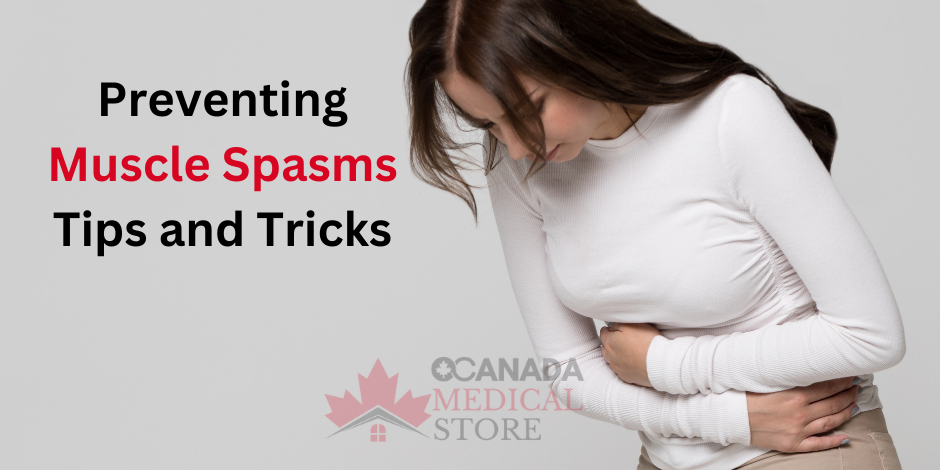Working for the whole day, taking stress while doing the job, and coming home after such a hectic day, we all want a good night’s sleep, but having muscle spasms between your restful nights may be irritating or painful.
In this blog, we will see important tips and tricks for preventing muscle spasms and helping you eliminate such problems.
What is a Muscle Spasm?
Muscle spasms are sudden, painful contractions of an entire muscle group. They are common for any individual and are unpredictable. It can happen to anyone and at any age. However, there are many ways to avoid muscle spasms. These are some of the most common types include
- Back Spasms
- Leg Cramps
- Neck Spasms
- Chest Cramps
- Abdomen Cramps
Are Muscle Spasms a Matter Of Concern?
In many cases, muscle spasms are not a matter of concern, but if you get spasms regularly, you should consult a doctor, as it can indicate the underlying neurological disorder. This neurological condition affects your brain, and your brain helps your muscles move.Proper exercise and various activities can help avoid muscle spasms or cramps.
What are the main causes of muscle spasms?
Having muscle spasms is common in anyone. There is no specific reason that causes spasms. But there are situations where you are more likely to get muscle spasms. Such situations are:
-
Low Electrolytes:
If you have experienced nasty bouts facing diarrhea/vomiting or have done an intense workout, you may have low electrolytes. Electrolytes are minerals and salts like sodium, potassium, calcium, or chloride. Low electrolytes can cause muscle spasms, so it’s important to have plenty of water during exercise to maintain electrolytes.
-
Dehydration:
It is important to keep your body hydrated. Without sufficient fluid, your muscles become more sensitive and can experience muscle spasms.
-
Stress:
When your mind is experiencing stress, your nervous system becomes overexcited and causes spasms.
-
Staying in the same position for hours:
When you have a busy schedule or important meetings for long hours, your body stays in the same position for a while, and then your muscles become contracted, which causes muscle spasms. It is important to walk for a while during your busy schedule to avoid muscle spasms.
-
Pregnancy:
Muscle spasms are very common in pregnant women, as half of the women who are pregnant experience muscle spasms once during their pregnancy period, especially during the last trimester. It is caused by weight gain or overwork in your legs. Spasms are resolved after giving birth.
Who gets Muscle Spasms?
Muscle spasms are common to anyone. However, people who engage in daily physical activities or sports commonly face muscle spasms. It is common in
- Athletes
- Pregnant Women
- Infants
- People over the age of 60
How long do muscle spasms last?
When you experience muscle spasms, you will notice that the muscles in that specific part are tightening. There is no particular time for muscle spasms, which can last seconds or half an hour.
Proven Tips to Prevent Muscle Spasms
It’s very tough to avoid muscle spasms as they are unpredictable and can happen at any time. But taking such precautions can help you avoid having spasms regularly. Such examples include
Comfy Shoes: Wearing comfortable shoes is important for any person or athlete. If you are standing for a long period, then having comfortable shoes is essential and prevents you from having bad muscle cramps.
Stay Hydrated: Hydrating your body is very important for avoiding cramps. After an intense workout or facing excessive heat, your body loses fluid, so it is important to have energy fluids to keep your body hydrated.
Stretching and Involving in Activities: Involving in various activities and stretching your body daily can help your body be flexible. Stretching for only 60 seconds a day can help avoid muscle spasms.
Taking Nutrients: Foods rich in magnesium and potassium can help prevent muscle spasms.
Sleeping position: Muscle cramps are normal in the leg calf, and cramps in the calf are the most painful place. Avoiding a bad sleeping position that puts pressure on your calf region can help you avoid spasms.
Types of Muscle Spasms
Extensor Spasms:
It occurs when the limbs extend, such as when a leg straightens away from the body.
Flexor Spasms:
It occurs when the limbs bend, common in patients with spinal cord lesions.
Adductor Spasms:
It occurs when the limbs are pulled toward the body, and it is common in areas like the thighs and groin.
Spasms of the trunk:
It occurs when a person with SPS is surprised or moves suddenly. If a person facing these spasms directly moves from bed or chair, they can also face such problems.
Can Deficiency Cause Muscle Cramps?
Balancing Vitamins and minerals in your body is very important. An imbalanced deficiency of vitamins and minerals can cause muscle cramps. Such deficiency includes
Calcium:
Calcium helps in muscle contractions. A low amount of calcium means that you will experience more muscle spasms than usual. Calcium deficiency focuses on the legs and back areas to create muscle cramps.
Magnesium:
Magnesium plays an essential role in muscle constriction and neuromuscular transmission. A magnesium deficiency causes muscle cramps. A diet like spinach, nuts, cashews, dark chocolate, or black beans can help you reach a good magnesium level.
Vitamin D:
Healthy blood flow is important for muscle function. Many people have low vitamin D levels without knowing it. Vitamin D deficiency includes muscle cramps or pain. Daily morning sunlight, oily fish, egg yolks, or Vitamin D supplements can help you raise your vitamin D deficiency.
Potassium:
When blood potassium levels go low, muscle cramps can occur, which can be painful. It helps relay signals from the brain to stimulate muscle contraction.
Conclusion
In this blog, we have covered tips and tricks that can help you with muscle cramps, tips to prevent such cramps, the importance of vitamins, and the causes of muscle cramps.
We have also seen the factors concerning muscle cramps. Overall, we have covered all the important aspects to help you prevent muscle cramps.
Frequently Asked Questions (FAQs)
Q1- What do you understand about muscle spasms?
Muscle spasms are very painful cramps that occur when muscles involuntarily and forcefully contract. They are common for anyone and at any age.
Q2- Which deficiency causes muscle cramps?
Balancing Vitamins and minerals in your body is very important. An imbalanced deficiency of vitamins and minerals can cause muscle cramps. Such deficiency includes
- Magnesium
- Vitamin D
- Calcium
- Potassium
Q3- What are the types of muscle spasms?
There are four types of muscle spasms, which include
- Extensor Spasms
- Flexor Spasms
- Spasms of the trunk
- Adductor Spasms
Q4- How are taking nutrients helpful, and which are the best nutrients for your muscle cramps?
Taking nutrients is very important for your body as it gives you strength. Meals that are rich in potassium and potassium can help prevent muscle spasms. The best nutrients for your body to avoid muscle cramps include,
- Fruits
- Eggs
- Grain
- Berry
- Sweet potatoes
Q5- How low electrolytes can create muscle cramps?
If you have experienced nasty bouts facing diarrhea/vomiting or have done an intense workout, you may have low electrolytes. Electrolytes are minerals and salts like sodium, potassium, calcium, or chloride. Low electrolytes can cause muscle spasms.




